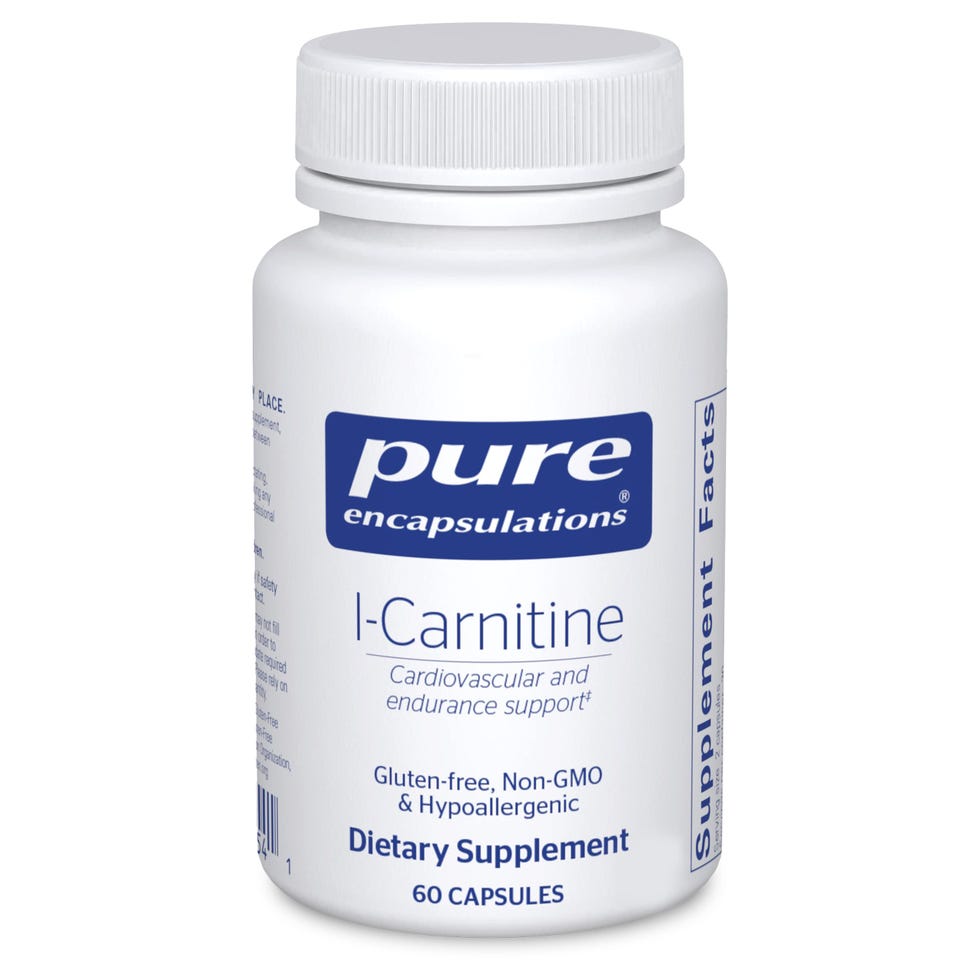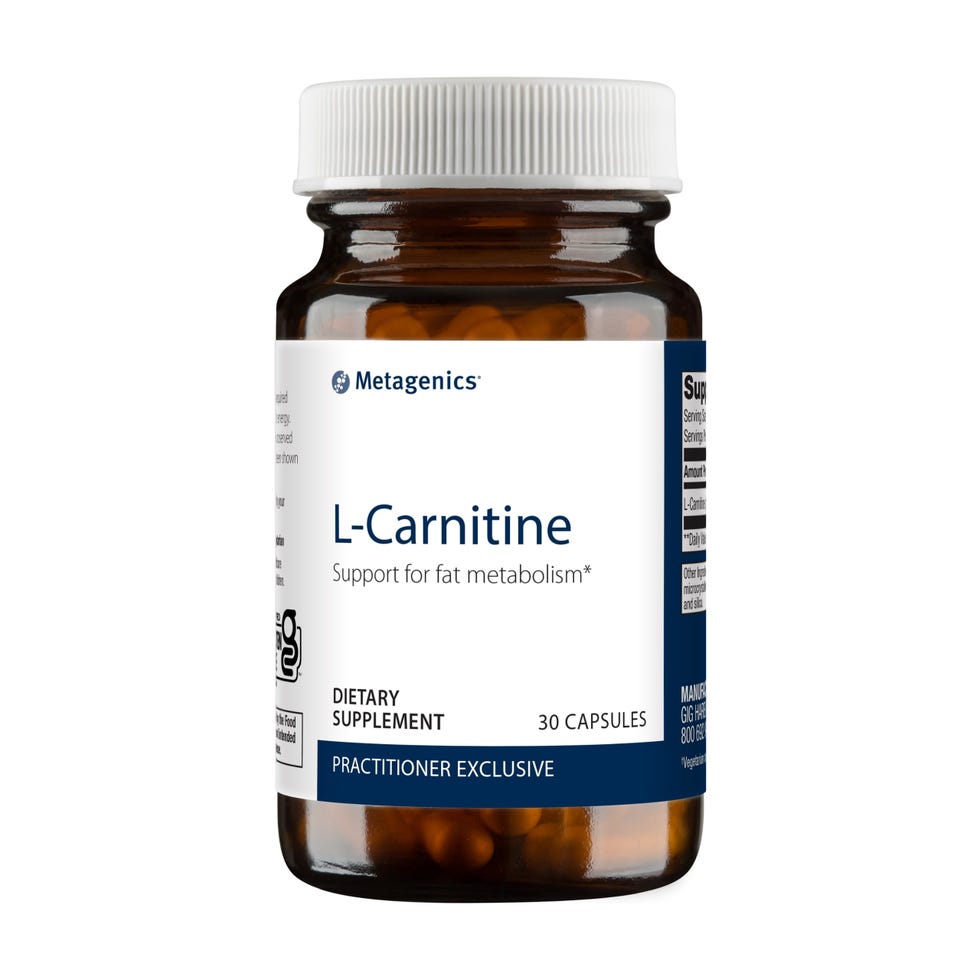Some of these supplement names are getting out of hand. Protein powder? Easy to understand. Creatine? A little tougher, but whatever. And now L-carnitine? It sounds like something straight out of high school chemistry class.
“L-carnitine is a naturally occurring amino acid derivative that your brain, kidneys, and liver generate from two other amino acids known as lysine and methionine,” says Avery Zenker, RD, the founder of Avery Zenker Nutrition. Amino acids are the building blocks of protein that support nearly every biological process in the body, including tissue repair, enzyme production, and synthesis of hormones, she says.
Meet the experts: Avery Zenker, RD, is the founder of Avery Zenker Nutrition. Morgan Walker, RD, is a dietitian at Lebanon Valley College. Natalie Allen, RD, is a clinical assistant professor of nutrition and dietetics at Missouri State University.
L-carnitine specifically may help produce energy for workouts, improve heart health, and even help ease PCOS symptoms. While you can get it through animal-based foods like beef, pork, poultry, fish, and dairy, it’s also available in supplement form, says Morgan Walker, RD, a dietitian at Lebanon Valley College.
Ahead, experts reveal everything you need to know about L-carnitine supplements—plus, who is best suited to take them.
Benefits Of L-Carnitine Supplementation
It might promote heart health.
“L-carnitine supplementation is associated with lower blood pressure, total cholesterol, LDL (bad) cholesterol, and triglycerides, and when these markers are elevated, the risk of heart disease and heart failure increases,” Zenker says. L-carnitine may also enhance energy production in cardiac cells to improve blood flow, reduce inflammation, and limit oxidative stress (an imbalance in free radicals and antioxidants that can lead to cell damage linked to aging and heart disease), she says.
It can potentially enhance exercise performance and recovery.
L-carnitine may increase exercise capacity, reduce muscle soreness, and improve recovery after resistance training, Walker says. This is primarily due to L-carnitine’s ability to preserve muscle glycogen and use fatty acids as energy during exercise, sparing the use of amino acids, making them available for new protein synthesis to rebuild and grow muscle, per 2020 research in Molecules.
It may reduce the risk of type 2 diabetes.
“L-carnitine supplementation has been associated with improved insulin sensitivity and glucose uptake, which could be beneficial in managing or preventing type 2 diabetes,” Zenker says. The compound may also reduce fasting blood sugar, according to 2023 research in Frontiers in Nutrition. At the same time, it can improve the function of beta cells responsible for producing insulin in the pancreas, per the research.
It might regulate PCOS symptoms.
L-carnitine supplementation in women with polycystic ovary syndrome (PCOS) has been found to improve ovulation (which is usually disrupted in those with PCOS). This may promote fertility and pregnancy rates, per 2022 research in Obesity Medicine. L-carnitine supplementation may also improve insulin sensitivity in women with PCOS, potentially aiding in weight management, Zenker says.
It can aid weight loss.
L-carnitine supplementation may reduce body weight, fat mass, and body mass index (BMI), especially in overweight individuals, per 2020 research in the Clinical Nutrition Espen. This is because L-carnitine aids fat metabolism by bringing fatty acids into the mitochondria of cells where they’re burned for energy, Zenker says. The process then helps the body utilize fat stores more efficiently.
Potential Side Effects Of L-Carnitine Supplementation
Taking up to 2,000 milligrams of L-carnitine a day is generally considered safe, though Walker says some people may experience the following side effects:
- Indigestion
- Nausea
- Stomach pain
- Dry mouth
- Fishy body odor (!)
Who Should (And Shouldn’t) Take L-Carnitine Supplements
“If you’re healthy and eat enough protein (especially animal sources), your body makes enough L-carnitine and supplementation is not necessarily needed,” says Natalie Allen, RD, a dietitian and clinical assistant professor of nutrition and dietetics at Missouri State University. However, vegans or vegetarians may benefit from a supplement since their diet naturally contains less of the compound, she says.
Given its benefits, Allen and Zenker say the best groups to supplement l-carnitine are those who:
- Are older adults
- Have chronic conditions such as prediabetes, heart disease, or Alzheimer’s
- Are on a weight loss journey
- Have PCOS
- Want to improve their athletic performance
- Follow a vegan or vegetarian diet
On the flip side, the following groups might want to avoid L-carnitine supps, including those who:
- Take anticoagulants, or drugs to prevent blood clots, like warfarin or aspirin, Walker says. (L-carnitine can enhance blood-thinning effects and combining the supp with anticoagulants may increase the risk of excessive bleeding.)
- Take thyroid medications like levothyroxine because L-carnitine may reduce their effectiveness, Walker says.
- Have a history of seizures, since L-carnitine may increase seizure risk, per the NIH.
- Are pregnant, since its safety hasn’t been thoroughly studied, Zenker says.
As with any supplement, it’s best to consult a doctor before incorporating L-carnitine into your routine, says Allen.
Should I take L-carnitine or a full amino acid supplement?
Whether you take L-carnitine or a full amino acid supplement depends on your goals, diet, and current health status. “A full amino acid supplement could help general protein synthesis and recovery, but won’t necessarily increase carnitine levels,” Zenker says. “If your goal is to increase fat metabolism or endurance performance, then direct L-carnitine supplements make more sense,” Zenker says. In general, though, full amino acid supplements are a convenient way to increase your amino acid intake if you don’t have food-sourced protein available.
How To Take An L-Carnitine Supplement
Most L-carnitine supplements come in capsule, tablet, or powder form. A typical L-carnitine dose is between 500 to 2,000 milligrams taken once daily, Zenker says. However, optimal dosage varies on the person because everyone’s L-carnitine stores contain different amounts. (If you’re wondering where you fall in that range, chat with your doctor.)
With most new supplements, it’s best to start with a small amount and monitor how your body responds. For instance, you can start with 500 milligrams, and if you don’t experience negative side effects like nausea, ingestion, or stomach pain—and your doctor gives the green light—Zenker says you can increase your dosage from there.
You can take L-carnitine at any time of day, but Zenker recommends taking it on an empty stomach or before meals for maximum benefit and absorption. For exercise performance, take it about one to two hours before your workout to enhance muscle uptake, Allen adds.
When it comes to choosing a supplement, go for one that’s been third-party tested—for example, National Sanitation Foundation (NSF)-, United States Pharmacopeia (USP)-, or Good Manufacturing Practices (GMP)-certified—to confirm it only contains the ingredients listed on the label and in the amounts stated.
Here are some of Zenker’s recs:
So, L-carnitine is a lot simpler than its name lets on. If you feel like you could use a little extra boost when it comes to your workouts and/or diet, try a supp.
Andi Breitowich is a Chicago-based writer and graduate student at Northwestern Medill. She’s a mass consumer of social media and cares about women’s rights, holistic wellness, and non-stigmatizing reproductive care. As a former collegiate pole vaulter, she has a love for all things fitness and is currently obsessed with Peloton Tread workouts and hot yoga.
Read the full article here






